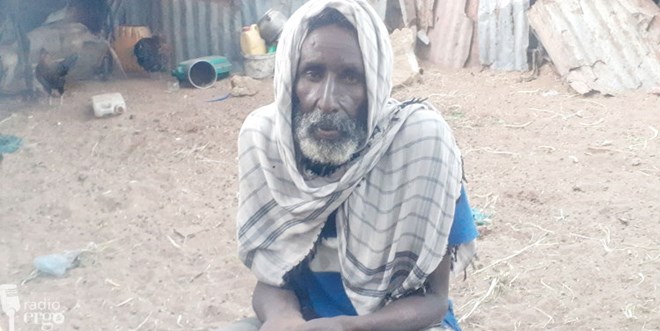
Saturday January 22, 2022

After a decade of living with HIV/AIDS, Khalif Farah Shuriye, 75, has been abandoned by all his close family and friends due to fear and stigma and is now barely able to fend for himself.
“I want to live! If I can get someone to help me, I can continue living!” Khalif told Radio Ergo’s reporter at his shack in Digfeer, in Mogadishu’s Hodan district.
“When I am sick, there is no one to look after me and no one comes to check up on me. Sometimes the neighbours only find out I am sick after I have been in bed for four days.”
With nobody to care for him in his old age, he lives in a leaky-roofed hut built for him by neighbours next to their livestock pen.
“I don’t have a proper shelter; this one can’t even protect me from the rain. There is no water, and I don’t have the strength to go and fetch it. I don’t have a child or a brother to support me financially. My relatives don’t support me at all,” he said.
The only belongings in his hut are a mat, two jerry cans, and two cooking pots given by a well-wisher. He survives on occasional meals from his neighbours, knowing that the amount he eats is too little for the medication he takes.
“Today, I count anyone who gives me something to eat as a brother. I eat what little I receive from a girl who is my neighbour. On the days she doesn’t have any food to cook, I stay hungry,” he said.
A year ago, Khalif’s 19-year-old daughter got married and moved with her husband to Galkayo. She had been a helpful companion to her father, but her husband did not want the old man in his house due to fear of the spread of disease. Her husband is also poor so they cannot send Khalif any cash.
Khalif’s eldest sister told him she fears contracting the HIV virus if she allowed him to stay in her home. His sons have also turned their backs on him.
“I only have two sons who are police officers. One of them left me while I was bedridden in the hospital and he never came back, and I didn’t go to look for him. How can you look for someone who left you at your vulnerable moment?” he said.
Khalif cannot buy water at 2,000 Somali shillings per 20 litres and is forced to beg 10 litres every few days from neighbours. He only gets enough for drinking, so he cannot bathe or wash his clothes.
Two years ago, he was forced to close his small business selling farm produce like beans and grain in Bakara market because other business owners in the market found out about his HIV status. They told him to keep away saying they feared contracting the virus due to overcrowding.
Khalif says he would start a small shop if he could get financial support. His wife, who had a mental illness, died in 2010 after falling sick. He suspects she died of HIV/AIDS. He himself tested positive after falling and seeking medical treatment in 2012.
He gets free antiretroviral drugs from the Somali Red Crescent. Sometimes when the ARVs are out of stock, he has to wait until they are available again as he cannot afford to buy from local pharmacies.